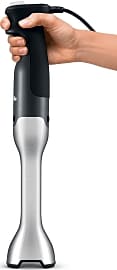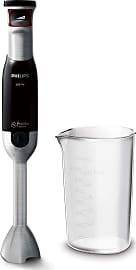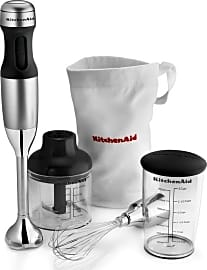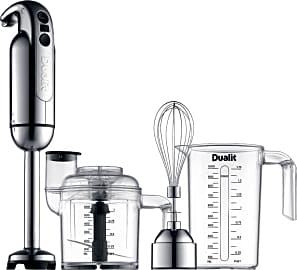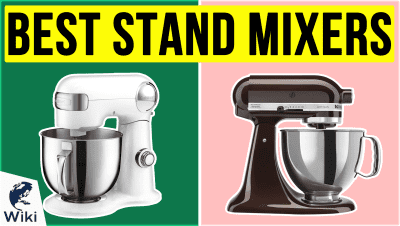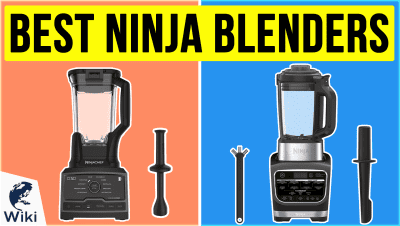The 10 Best Immersion Blenders

This wiki has been updated 43 times since it was first published in March of 2015. Whether you're making a smoothie, a salad dressing, or soup, the right machine can make your task a lot easier. These immersion blenders are easy to hold in one hand and will make the world of difference, whether you're prepping a huge pot of gazpacho or a single malted shake. Here are some of the most powerful, cost-effective, and long-lasting models designed for amateur and professional cooks. When users buy our independently chosen editorial choices, we may earn commissions to help fund the Wiki.
Editor's Notes
August 25, 2020:
Immersion blenders are a great time saver in the kitchen. They are not only less cumbersome to clean than standard blenders, but they are more versatile, too. Whether making soups, purees, sauces or smoothies, one of our recommended models can help you tackle the job with ease.
During this latest update, we replaced the Braun MultiQuick MQ777 with the newer Braun 4-in-1 MQ7077, which features a shaft that the user can pump up and down while in operation. This moves the blades up and down, thereby increasing the effective cutting surface and pureeing the ingredients quicker than those with fixed-position blades.
We also replaced the Robot Coupe CMP 250 VV with the bigger and more powerful Robot Coupe MP 450 Turbo. While this latter model doesn't offer variable speeds, it does have a longer shaft that makes it better suited to blending large quantities. Considering this is included for professional chefs, we thought it smart to choose a model with a very high capacity, especially since we already have the Waring Quik Stik, which is also durable enough for restaurant use but has a smaller form that makes it well suited to small batches. The Waring WSB50 is another commercial option, but this does offer variable speed control and spins at a maximum of 18,000 RPM. It can be purchased with a range of shaft sizes too, so there is one to fit most needs.
Other than those changes, we still stand by all of our previous recommendations. When it comes to affordability for the home user, the Braun MQ505 and Bella 14460 both immediately jump to the top of the pack. While similar in functionality, the Braun does seem to be of better quality, so it is probably the smarter option for anyone who plans to use their immersion blender often. If you value versatility over a budget-friendly cost, the Braun 4-in-1 MQ7077 and Breville BSB510XL, both of which feature variable speed control and come with a variety of accessories are going to be a better options.
April 29, 2019:
If you've never owned an immersion blender, you may be shocked at how incredibly useful they are. They're commonly used in restaurants, where you'll frequently run into models like the Robot Coupe and the Waring, which can both stand up to full-time use without difficulty, though they're not the most versatile for home cooks. If you want to spend the bare minimum, check out the Bella, but don't get it if you plan to use it for multiple meals every day. The KitchenAid and Epica are also good budget-friendly options, but the Braun MultiQuick 5 is similarly inexpensive and is almost as powerful as many high-end models. Speaking of power, the Dualit does a good job pureeing almost any vegetables, and it looks great while doing it. Even more effective are the Braun MultiQuick 7, the Philips ProMix, and the Breville, and while they're a touch on the costly side, they're very much worth the investment.
Special Honors
Globe Equipment GIB500-12 With a 3/4-HP motor and variable speeds that range from 4,000 to 16,000 RPM, the Globe Equipment GIB500-12 offers plenty of power and precision for most commercial applications. It has a seven-foot long cord, its removable shaft is dishwasher safe for hassle-free cleaning, and its stainless steel blades can handle hard foods without getting damaged. globeequipment.com
Immerse Yourself
At the end of the shaft is a wand with a blade grinder attached; similar to a coffee blade grinder.
An immersion blender is a handheld kitchen appliance used for mixing and blending ingredients. Also known as a hand blender, it is primarily used for smoothies, baking, and soups. The blender purees and emulsifies liquids, however, it can be used on solid ingredients as well. The immersion moniker tips the consumer off that the blender is designed to be immersed in the dish being cooked, as opposed to a stand mixer or blender which mixes the ingredients in a designated bowl. The biggest advantage to this is the ability to blend the ingredients in the vessel of your choice; no special or large mixing bowls are required to operate a hand blender. The mobility of the handheld device is also an advantage over countertop appliances.
A common misconception is that an immersion blender is interchangeable with a worktop blender, food processor, or stand mixer. It is none of those, and it has earned real estate on the kitchen countertop in its own right. The stand mixer can only blend or mix the ingredients, whereas a hand blender is capable of chopping the ingredients as well.
In order to do so, an immersion blender is equipped with a shaft that houses an electric motor. At the end of the shaft is a wand with a blade grinder attached; similar to a coffee blade grinder. This is known as a blade mill. The sharp edges of the blade rotate at a rapid rate, like a propeller, to chop ingredients and emulsify liquids. The blade is usually constructed of stainless steel and may be detachable for easy cleaning. A shield placed above the blade prevents injuries and ingredients from splashing out of the bowl.
The Bells and Whistles
If you deem an immersion blender an essential item to your kitchen repertoire, you shouldn't pick up the first old blender you see. First, take a realistic look at your kitchen habits and the amount of baking and cooking you routinely take part in. Most complaints about immersion blenders are not about their overall quality, but rather that they are underused and collect dust in the kitchen.
First, take a realistic look at your kitchen habits and the amount of baking and cooking you routinely take part in.
The immersion blender is designed to be handheld, however, you should be wary of that claim. The sheer weight of the unit can be a factor. Considering that it is handheld, holding a heavy blender can cause fatigue, making it cumbersome to hold for an extended period of time. If you perform a heavy volume of mixing, perhaps a stand mixer or blender might be more appropriate for your kitchen.
The weight of the blender is primarily attributed to the size of the motor. The motor is equipped to blend the ingredients smoothly. The larger the motor, the more it will be adept at handling thick batters and hard materials.
While not serving a particular function, many consumers will factor in the appearance of the blender. The mise en place of your kitchen might call for a black blender, even though the silver model will be of higher quality. Do not be swayed by flashy models with unique colors that might distract you from flaws in the appliance's performance.
The accessories of the models are often worth the additional cost. The primary function of the blender is to cut, however, the additional attachments make the appliance more versatile. Some blenders include an extra storage vessel, additional whisks or accessories, and even options as far as handles are concerned. Also, some models boast cordless operation, making them more convenient and safer when moving around the kitchen. In those instances, such blenders are equipped with charging stations with more limited battery life when used cordlessly.
A History of the Immersion Blender
Since humanity has existed, we have needed subsistence to survive. Food must be prepared to kill bacteria and ensure that meals are both balanced and palatable. If we leap forward a couple of millennia, we will see that little has changed; food is still prepared and mixed in the modern age of kitchen culinary endeavors. The primary action in preparing food is mixing the ingredients.
For the average consumer, they are not a necessity, however, they are designed to make life easier.
The precursor to the immersion blender was the stand mixer, introduced in the United States over one hundred years ago. While efficient and durable, the design was limited to an anchored machine and its mobility was limited.
The immersion blender was invented by Roger Perrinjaquet in Switzerland in 1950. He cleverly labeled his invention the bamix, which is a portmanteau of the French words bat et mixe (beat and mix). After a decade of obscurity, the blender gained popularity in the rest of Europe in the 1960's. It wasn't until the 1980's that the hand blending craze reached the United States, where it revolutionized blending.
With this new appliance, consumers got wise to the uses of the blender. New parents discovered that they could puree homemade baby food at a cheaper cost. Sauces, soups, and marinades of the highest quality were now being mixed by kitchen DIYers.
Today, immersion blenders are in the canon of luxury kitchen appliances. For the average consumer, they are not a necessity, however, they are designed to make life easier.



